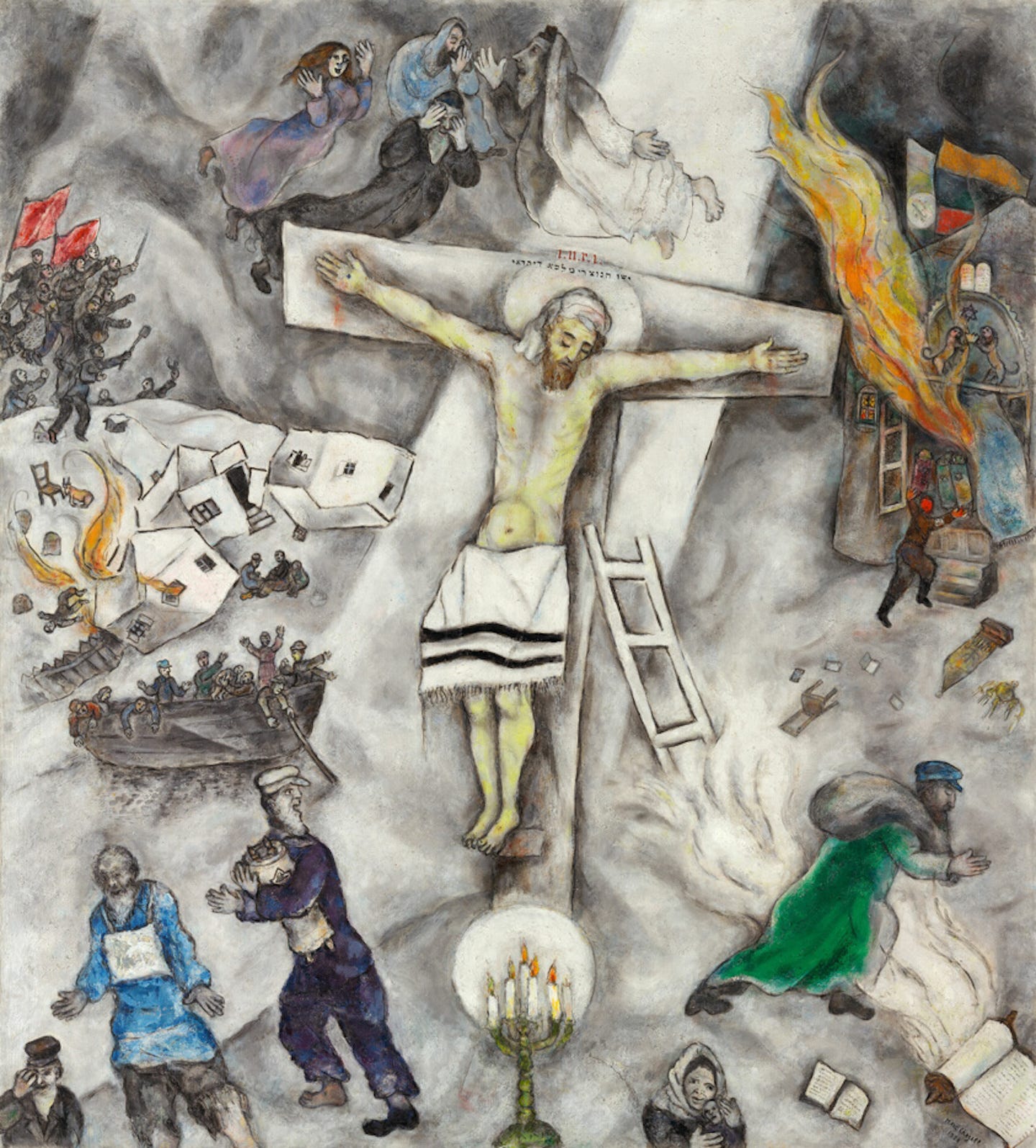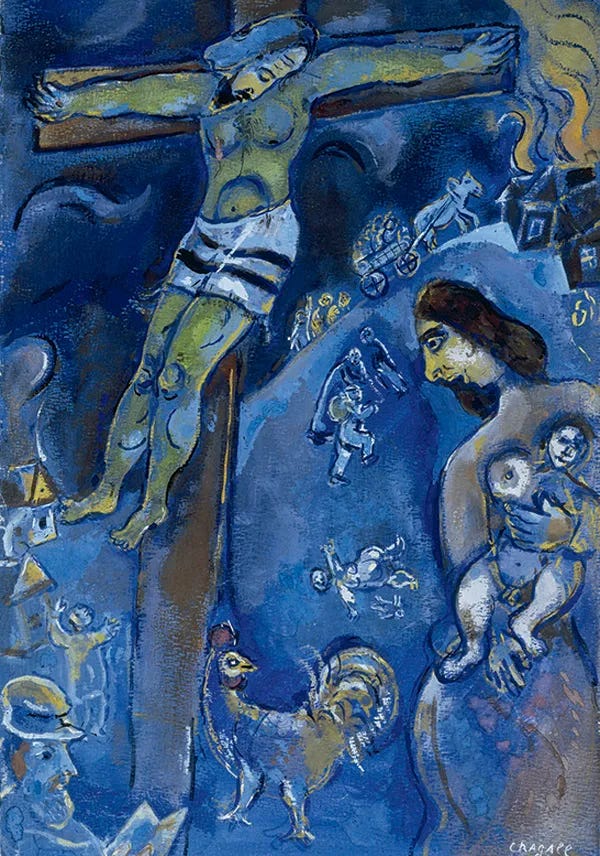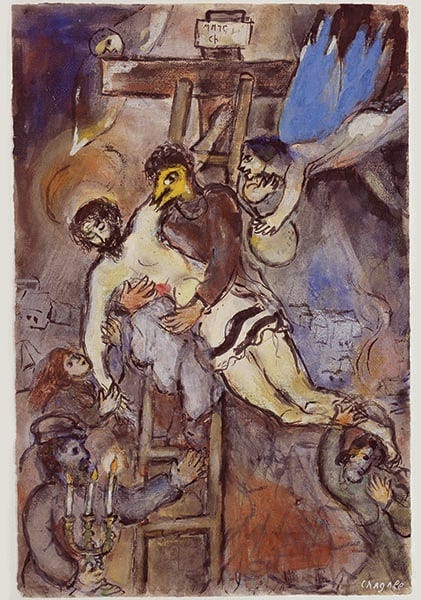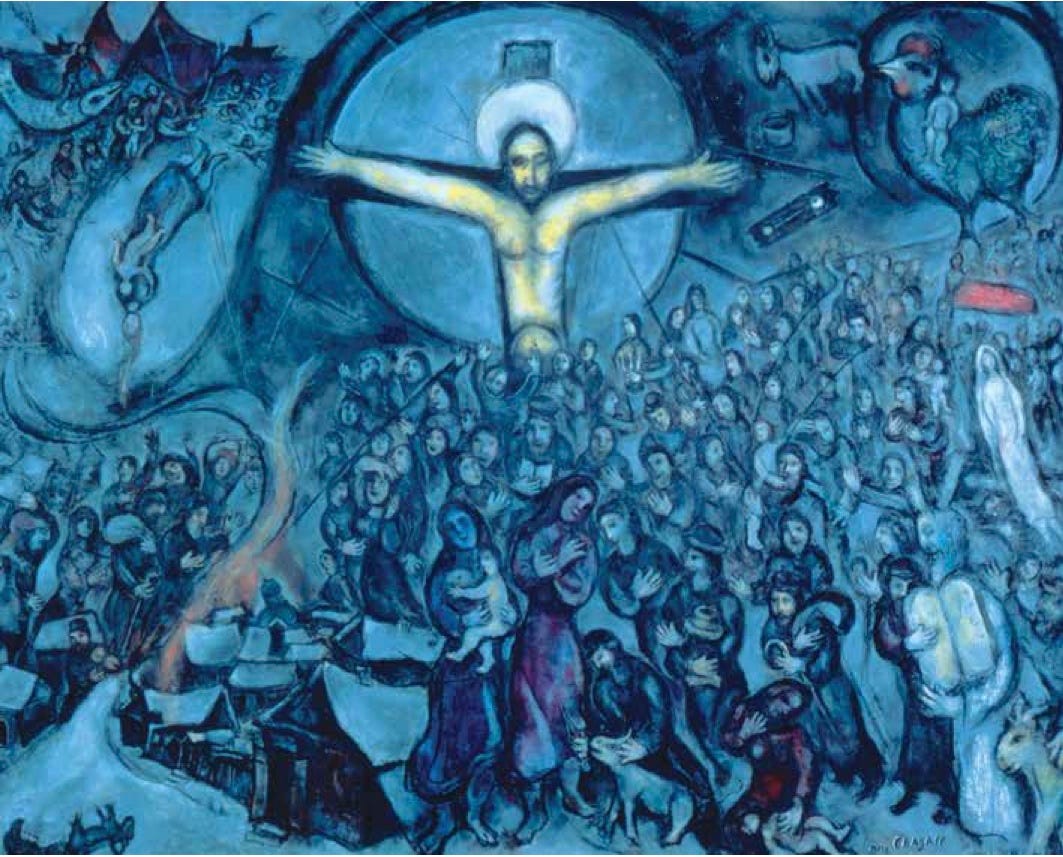Revelation 15.1-8
Two days after the 10/7 terrorist attack on Israel, I spoke with my friend Liel Liebowitz who is an Israeli journalist.
Words fail.
Not knowing what to say, I simply asked him a question.
“What have the last two days been like for you?”
Liel replied:
“You know, Jason, I am a ninth generation Israeli. I served in the Israeli Defense Force. I have endured many gun battles. I've survived several wars. I know from this, I'm no squish, but when I started receiving frantic phone calls from my family in Israel, unusual on a Shabbat morning, and I rushed to look at these horrendous images and I was shocked not only to see what was happening, but to see, in an unprecedented manner, these atrocities being live streamed on the internet, to see terrorists rushing into the home of an eighty-five year old woman, grabbing her phone, torturing and murdering her while filming their crimes on her own phone and then posting it to her own Facebook page so that her family would see their atrocities. Even after everything I saw during my years of service, this was a level of demonic barbarism that shocks me. To see Jews, once again, go like sheep to the slaughter, our babies like sheep to the slaughter— our horror, it’s indescribable.”
Though words fail to capture the indescribable, words are nonetheless necessary for Jews to remember (as they have always had to remember). Thus, Liel has begun a project for Tablet Magazine, archiving eyewitness testimonies from the Hamas massacre in Israel. I asked Liel to share some of the accounts he has documented.
He told me about the five star chefs in Tel Aviv who immediately turned their restaurant kitchens kosher so they could send food to the front lines.
He told me about the Jewish businessman at the El Al ticket counter at JFK in New York, who took out his credit card, held it up in the air, and announced to everyone in line, “This credit card has a cash limit of half a million dollars. Anyone who can show me a note from the Israeli army that he or she is going back to fight in this war, I will pay for your ticket right now.”
He told me about an elderly cab driver in southern Israel who was driving around Saturday morning when he came across a bunch teenagers running, covered in blood, hysterical, barefoot. “So the old man— he’s in his 70’s,” Liel told me, “he stops and picks them up in his cab and asks what had happened. And they tell him that they had been to this music festival when terrorists came. As the cab driver explained it to me, “Right then and there, I understood, I have to save as many of them as I could.”
And then Liel said to me:
“This old man drove around for over an hour under heavy gunfire, grenades, RPGs flying like right over his head, picking up as many kids as he could, cramming them into his cab. He saved something like thirty or forty lives.”
After I listened to some of the stories Liel has collected, I asked my friend what Christians could do for Jews.
“Well,” he said, “I think it’s really very easy. It really is three simple things. The first is call a Jewish friend. The second thing you could do is double down on being great Christians: worship God, study his word, and commit yourselves to the teachings of our faith.”
After we stopped recording, I said to Liel, “You said there were three things we could do.”
“What’s that?” he asked.
“Three things— you said there were three things Christians can do but you only mentioned two of them.”
“And the third one is the most important one of all!” he exclaimed, “especially for clergy!”
“What is it?”
“Remind your people that salvation is of the Jews. Remind Christians that salvation is from the Jews.”
If his was not a word from God, then this passage most surely is the word of God.
And, notice, it bears the selfsame message.
The Apocalypse is as much a book of sounds as signs. What the Spirit reveals to John are auditions as much as visions. Thus far, the Seer has encountered two signs. Now John beholds a third sign in heaven. But a sound also accompanies the sign.
The Spirit shows the prophet seven angels armed, like the angels of Exodus, with the wrath of God. Their plagues are the final plagues “because the anger of God is fulfilled in them.” However, before the Lord’s wrath is ended, in the midst of this third sign, the Seer hears another sound, a brief eruption of rejoicing.
Much like the Israelites stood on the banks of the Red Sea and sang as the walls of water fell upon Pharaoh’s soldiers, John sees the company of heaven standing beside “a sea of glass mixed with fire” and singing about the coming judgment and deliverance of the Lord.
According to the prophet, the music in heaven is polyphonic.
The beloved community praises God with two simultaneous melodies.
The company of heaven sing the Song of the Lamb, a song which John heard previously:
”Worthy is the Lamb that was slaughtered to receive power and wealth and wisdom and might and honor and glory and blessing!”
And those gathered around the Lamb also sing, says John, the Song of Moses:
“I will sing to the Lord, for he has triumphed gloriously;
horse and rider he has thrown into the sea.
The Lord is my strength and my might,
and he has become my salvation;
The Lord is a man of war;
the Lord is his name.”
At the beginning of the Apocalypse, the prophet sees heaven’s throne surrounded by both the twelve apostles of the church and the twelve patriarchs of the people Israel. Now, in this third sign, John hears what he previously saw. Straightforwardly, John hears Christians and Jews together, in the Spirit, praising the God of Israel and the Lamb who is Israel’s Lord made flesh. Indeed that the Seer hears the Song of Moses first, that Israel’s song has priority, suggests that in the New Jerusalem the tribes of Israel will lead the church’s gentiles in praise of her Lord and study of his law.
On its face this is not surprising.
After all, the Lamb is himself one of the Israelites who sings the Song of Moses.
“The End is music,” as Robert Jenson writes, but the music is polyphonic.
There are two simultaneous melodies.
The polyphony of the Last Future bears implications for the present day, for if the End revealed to the prophet John shows that the Fulfillment does not conclude God’s purposes with his people Israel, then neither are the Lord’s aims for them ended in the meantime.
Salvation still is of the Jews.
As the apostle Paul understood in his Epistle to the Romans, the promise was never:
“I will be your God and some other people will be my people.”
And therefore the question was never, “Are the Jews saved?”
The question is always, “Are we?”
On a Friday night in April almost thirty years ago, in the dining room of his family’s Nebraska home, Rabbi Michael Weisser opened his Haggadah and began to read the Passover script in Hebrew. As Moses had taught, the Passover that night in Nebraska began with the youngest child asking, “Why is this night different from all other nights?” And as always, Weisser gave the ritual response, commemorating the Jew's rescue from slavery. Rabbi Michael made no mention of the other factor that made this Passover night different from all other nights. Sitting at the table with Michael and his family and their friends was Larry Trapp, an ailing, near-blind diabetic who only recently had been an avowed Neo-Nazi and the Grand Dragon of the Lincoln Ku Klux Klan.
In 1991, Rabbi Weisser and his family moved from New York to Lincoln, Nebraska where he served as cantor and spiritual leader of the South Street Temple, the oldest Jewish congregation in Lincoln. One Sunday morning, only a few days after the rabbi and his family had moved into their new home, Larry Trapp phoned the rabbi and snarled an ugly, anonymous threat, “You’re going to be sorry you moved into that house, Jew boy.”
For Trapp, who was forty-two at the time, the call was just another message of a lifelong campaign of racial hatred.
“The Klan was power and community,” he says. “I loved it.”
Trapp worked for the Klan out of his home, harassing victims over the phone. No strangers to bigotry, the rabbi and his wife refused to be victims. The rabbi called the police, who quickly figured the perpetrator was Larry Trapp, who was known in the Lincoln community as a white supremacist.
Surprisingly, the rabbi decided to reach out to Larry. Every week, right before he taught Bar Mitzvah lessons, Rabbi Michael, would call Larry and leave a message on Larry’s answering machine.
“Larry,” he would tell Trapp, who had lost both legs to diabetes in 1988, “with your physical disabilities, the Nazis would have made you the first to go.”
Or, “Do you really want to face God with all this hatred, Larry? Let me help you.”
The rabbi kept at it.
He kept calling Larry for months.
“Why are you calling me? You are hassling me!” Larry griped, when he finally answered the phone one day.
“I just want to talk to you,” said Rabbi Michael.
“What do you want to talk about?”
And Rabbi Michael replied, “I hear you’re disabled, Larry, and I thought you might need a ride to the grocery.”
“For a minute there was this dead silence,” the rabbi said, “but then the tone of his voice completely changed. He said, ‘I’ve got that taken care of, but thanks for asking.”
As Larry Trapp later told the NY Times, “I could detect love in Michael’s voice. I had never heard love from a stranger before. I felt lonely.”
Rabbi Michael kept calling, week after week, month after month, leaving what the rabbi called “love notes” on Larry’s phone.
“Larry, there’s a lot of love out there and you’re not getting any of it.”
Finally, one evening in 1991, on the sabbath, Larry Trapp called the rabbi back.
As Rabbi Weisser recalls it, “Larry said, quote-unquote I’ll never forget it, it was like a chilling moment, in a good way. He said, “I want to get out of what I’m doing, and I don’t know how. Can you help me?””
When Larry opened the door to them, he was holding a gun. But Larry handed the gun to this rabbi, and then he invited them inside.
Stepping inside, the rabbi offered Larry his hand.
“It was like a jolt, an electrical current,” said Trapp, brushing away tears. “I looked down at my hands, at my two Swastika rings, and I took them off. I said, I can’t wear these anymore. They’re a sign of hatred.”
Inside Larry’s home, the three of them talked for over three hours. Not surprisingly, Larry told them about his childhood history of abuse. Before they finished, Larry wept and confessed to the rabbi, “I don’t want to be who I have been.”
Even more remarkable—
Larry wasn’t just disabled. Larry was sick, chronically so. His kidneys were failing. So, the rabbi and his wife decided to welcome Larry into their home and to take care of him. They invited him to sleep in the bed of the daughter whose life he’d once threatened. Rabbi Michael’s wife, Julie, gave up her job in order to be Larry’s full-time caregiver.
I have shared that story before as an illustration of grace; the rabbi did not regard the sinner according to merit and demerit.
But today I tell the story as the prose counterpart to the poetry the prophet hears in heaven. As with Larry Trapp so for all us gentiles.
The Last Future just is the sound of Jews welcoming us into their home to glorify the God of Israel and enjoy him forever.
In the second century, a theologian named Marcion of Sinope argued vociferously that the God of Israel’s scriptures— allegedly violent and full of wrath— could not possibly be the Father of the Lord Jesus Christ. Marcion expunged the Old Testament and even redacted the New Testament to conform it to his convictions. Although the church quickly condemned Marcion as a heretic, going so far as to excommunicate him in 144, Marcionism has survived and often thrived in the church.
The ancient heresy abides in no small part because Christians neglect to consider “Israel’s place in that will of God which the church relies for her own meaning.” But Christians must have a theology of Israel because, as the Apocalypse makes clear, Judaism does not fall under the rubric of comparative religion.
The church can regard neither the old Israel of scripture nor contemporary Judaism as an other religion.
For example, if a Jew wished to convert to Christianity and join the church, then he or she would be exempt from the renunciation formula in our baptismal liturgy exactly because he or she already had been worshiping the true God.
Christians can disagree about the politics of present-day Israel.
But Christians cannot broker any compromise on the Christian claim that we are bound eternally to the Jews as Jews.
The extent to which this strikes you as new information is the cause for the church to lament and repent.
It is the straightforward teaching of the New Testament that Israel must continue separately from the church as a necessary part of God’s final intention. Much like Marcionism, the proposition that the church has replaced Israel in God’s intentions may be common but it is nevertheless a pernicious heresy, today called supercessionism.
Remember, scripture anticipated the resurrection of all Israel not a single Israelite; likewise, scripture promised that the resurrection would occasion a final judgment, the permanent overturning of injustice, and the immediate arrival of the Kingdom.
This is not what the Father did with the Son.
Like so many of the wanderings in the Old Testament, the Lord took a detour. Israel’s Messiah has come but not in such a way that consummates Israel’s vocation.
As Robert Jenson writes:
“The truth is simple if at first perhaps surprising: God institutes the church by not doing something, by not letting Jesus’ resurrection be itself the End, by appointing the famous “delay of the parousia.” At the ascension, Luke has the disciples ask, “Lord, is this the time when you restore the kingdom to Israel?” Jesus avoids the question, and instead he promises the gift of the Spirit as the power to conduct a mission to the gentiles. The church, which came when the kingdom should have come, and leads to the kingdom by way of the mission to the gentiles, is precisely a detour from what before the fact had to be seen as the straight line of God’s purpose. Detours, indeed, are not uncommon in the Lord’s history with us.”
Again, it’s a strict correlative to the doctrine of justification that what happens happens according to the will of God.
Therefore, what has happened is what God had to happen; that is, Israel did not credit the claims about her risen messiah. She did not do so; so that, the church would take the gospel to gentile world. As the apostle puts the matter clearly, God has consigned Jews to disbelief in Israel’s messiah as a intermediate component to his saving work for all.
Jenson writes:
“After the fact we can discern the appropriate step in the story: what had to happen is a gathering of the gentiles that is at once a mission conducted this side of the End and an event of the End itself. The needed step in the story is a body of Jews and a body of gentiles within the last great Day of the Lord, within the space opened by the delay of the Lord’s final advent, a detour from the straight path of the kingdom.”
“I will be your God and you will be my people.” This is not only the central promise of Israel’s scriptures, it’s a promise the church’s New Testament takes for granted. For instance, when the New Testament references “the people of God,” in every case but one it refers to the Jews. And even in the lone example when it does not refer to the Jews exclusively, it refers to the church in her relation to the Jews.
Following the strict logic of the New Testament:
Because the promises cannot fail, Israel abides as the people of God.
Meanwhile, the church can now claim to be the people of God only as an element of her hope, “only as she claims to be in God’s intention one people with the continuing nation of the Jews, and she must make this claim whether the recognition is reciprocated or not.”
In other words, Christians can lay claim to be God’s people only on the basis of the promise that in the End our song to the Lamb will be added to Israel’s more enduring melody.
It’s not simply that in Mary’s boy and Pilate’s victim, God became a Jew.
In that Mary’s boy ascended to the Father’s right hand, the second person of the Trinity remains a Jew, eternally so.
And because the Son is the Israelite through whom we are incorporated into the triune life, the Jews are the people through whom we can claim to be God’s people.
Salvation is from the Jews.
This is nothing more than the mystery scripture names when it refers to the church as the body of Christ.
The risen Christ is the church but the risen Christ is also other than the church.
Both of the New Testament’s propositions are true.
On the one hand, “Lo, I am with you always.”
On other hand, “This Jesus, who was taken up from you . . . will come in the same way . . . .”
When the risen Christ is no longer other than the church, the “totus Christus” will be realized and God will be all in all.
But in the meantime—
Where is the risen Christ when he is other than the church?
Once again, the answer is simple if perhaps initially surprising:
In that he is a Jew, in that his proper people is Israel, and in that the continuing community of Israel is a community other than the church, the risen Jew, Mary’s boy Jesus, must now not only be embodied as the church, but embodied also in the people Israel—until the End when the Song of the Lamb and the Song of Moses will resound into the simultaneous music of one people.
That Passover night in Nebraska, when the Haggadah was complete, Larry Trapp sat in the Weisser’s living room listening to Michael discuss the scriptures when Weisser’s daughter, Rebekah, interrupted them, kissing Trapp on the top of his balding head and offering to give him a facial.
Trapp laughed, and Rebekah returned a giggle. “Feels great,” she says. “Doesn’t it, Uncle Larry?”
Just so, when Larry’s kidneys failed, Rabbi Michael told NPR that it felt like he had lost a member of his family.
In that Larry, like most of us, was a Gentile, our gospel hope is that the rabbi was right.
He had lost a member of his family.



















Share this post